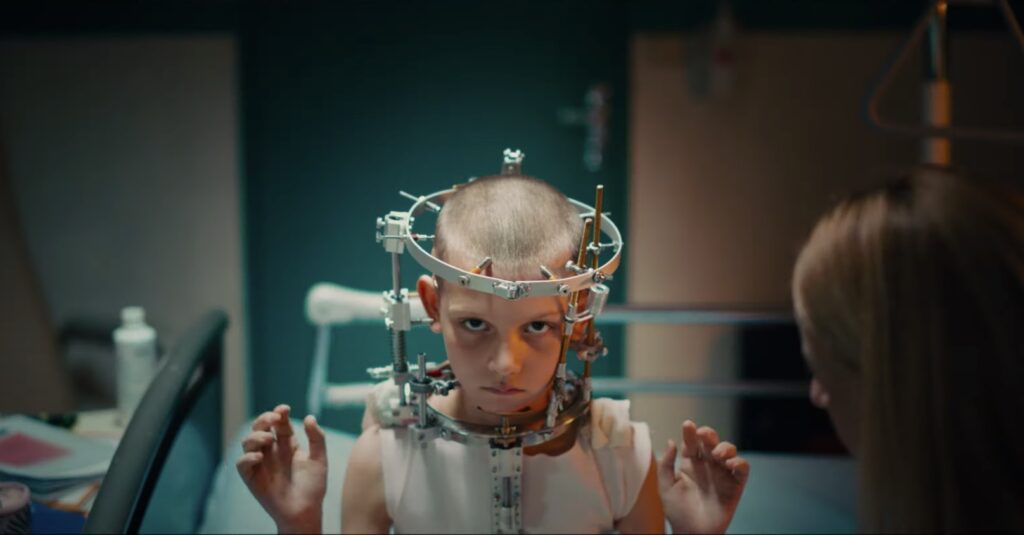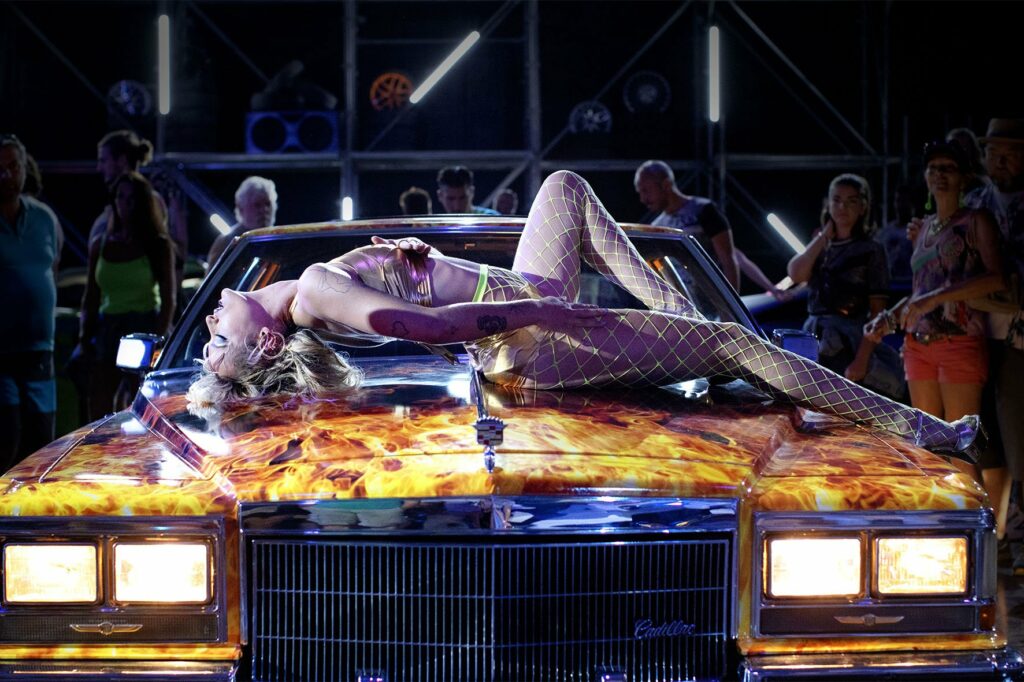In the opening moments of Julia Ducournau’s Titane, we find young Alexia (Adèle Guigue) in the back of her father’s car, making engine revving noises and antagonistically kicking the back of his seat. She takes off her seatbelt, he turns to scold her, the car spins out and Alexia’s head splats against the window. Cut to extremely graphic images of the inside of the child’s skull being fitted with a titanium plate. Emerging from the hospital, Alexia strides away from her parents and towards a car, which she embraces and gives an affectionate kiss. Seatbelts on – you’re in for a wild ride.

Years later, Alexia (now played by Agathe Rousselle in a phenomenal feature acting debut) works as a dancer at automobile shows, where we see her seductively writhing over a flame-decaled Cadillac. She’s also, as we discover in a couple of morbidly funny scenes, a prodigious serial killer whose weapon of choice is the metal hair pin she wears. After she claims a creepy fan as her latest victim, a menacing thudding noise beckons her from the shower – it’s the Cadillac. There’s no polite way to describe what happens next… Alexia fucks the car. Soon she’s pregnant; the motor oil she produces in place of breast milk hints at who the daddy might be.
When Titane won the Palme d’Or back in July, there were echoes of David Cronenberg’s 1996 mechanophilic provocation Crash, which similarly shocked audiences and scooped the top prize at Cannes. As with her debut Raw, there’s certainly much to be said about Ducournau and Cronenberg’s shared interests in anxieties around the boundaries of the body in all its fleshy, fragile forms. But where Crash was cool, detached, even mechanical in style, Titane is more openly seductive, its characters more emotionally vivid. Cronenberg drenched steel in blood, oil and semen; Ducournau adds her own element: fire.

When Alexia’s latest killing spree forces her on the run, she has a bonkers, brilliant idea: shaving her hair and eyebrows, binding her breasts and – in an almost unwatchable moment – breaking her nose on a bathroom sink, she attempts to pass herself off as Adrien, the long-missing son of ageing fire chief Vincent (a fantastic Vincent Lindon). Bizarrely, it works. Vincent, willing to entertain whatever self-deception is necessary to bring his boy back, refuses to even take a DNA test: “Think I can’t recognise my own son?”. Before long, Alexia/Adrien is put to work in the fire station.
In this new world, intense hypermasculinity masks an unsubtle homoeroticism that Alexia’s presence is able to tease out. The firemen throw two parties: in one, they sway to Future Islands’ “Light House” in slow motion, bathed in purple light; in another, they wildly mosh topless to gabber (the respective scenes, captured sensitively then riotously by Ducournau and her cinematographer Ruben Impens, show off the breadth of their talents). At the latter party, Alexia/Adrien dances erotically atop a fire engine, scandalising the men who look on with utter bemusement. It’s a simple but illuminating point about gender roles and lust that also manages to be wickedly funny.

In other places – those in which Ducournau embraces visual tropes of the body horror genre – Alexia’s gendered existence is altogether less than pleasant; in multiple scenes, she is seen excruciatingly binding not only her breasts but her swelling pregnant stomach. Vincent, too, is attempting to inhibit a corporeal transformation he cannot control: alone at night he miserably injects himself with steroids, hopelessly trying to maintain the failing physique of his youth. In Titane, any visions of liberating metamorphosis come hand in hand with a deeply felt anxiety, centred on the failure to reconcile the bodies we possess and the bodies we desire.
If this makes the film more than a little relatable for queer audiences, there’s also the danger that, taken literally, Ducournau’s delight in all things graphic, icky and downright shocking risks making a monster out of gender, sexuality, even embodiment itself. It’s an interesting tension played out within the genre of body horror: that our glee in watching the supposed transgressions on screen risks slipping into those very phobic attitudes that sustain their designation as transgressive. Hence why some critics will discover in Titane a sensitive, liberatory trans allegory, while others will see only misogyny and transphobia.

I’m more drawn to the former interpretation; at the very least, the film’s promise of a cyborg infant is surely an invitation to read the film in more abstract terms. But even taken more literally, Titane’s real shock – its most genuine transgression – is that it is ultimately a story about love; that out of this wreckage of blood and guts and oil and fire emerges a refreshingly queer take on kinship. You might squirm at the film’s violence, but there’s beauty to be found in watching Rousselle and Lindon opening up the relationship between their hardened characters into something positively tender.
Titane releases in UK cinemas on December 31st. It screened as part of the BFI London Film Festival 2021.
